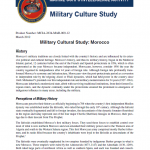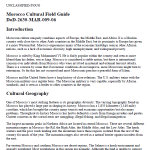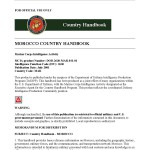
Morocco’s military traditions are closely linked with the country’s history and are influenced by its extensive political and cultural heritage. Morocco’s history, and thus its military history, began in the Medieval Islamic period, 12 centuries before the end of the French and Spanish protectorate in 1956, which is often represented as the year Morocco became independent. Moroccans, however, consider 1956 the year the country regained its independence after 44 years of foreign rule. Although foreign rule profoundly transformed Morocco’s economy and infrastructure, Moroccans view the post-protectorate period as a reversion to independent rule by the reigning Alawi or Filali dynasties, which had held power in the country since 1660. Mohamed V presided over this independent rule and military modernization for 34 years (1927–1961). Moroccans inherited a modernized state, albeit with surviving traditional institutions, from their former European rulers, and the dynastic continuity under the protectorate ensured the prominent re-emergence of indigenous influence in many areas, including the military.


